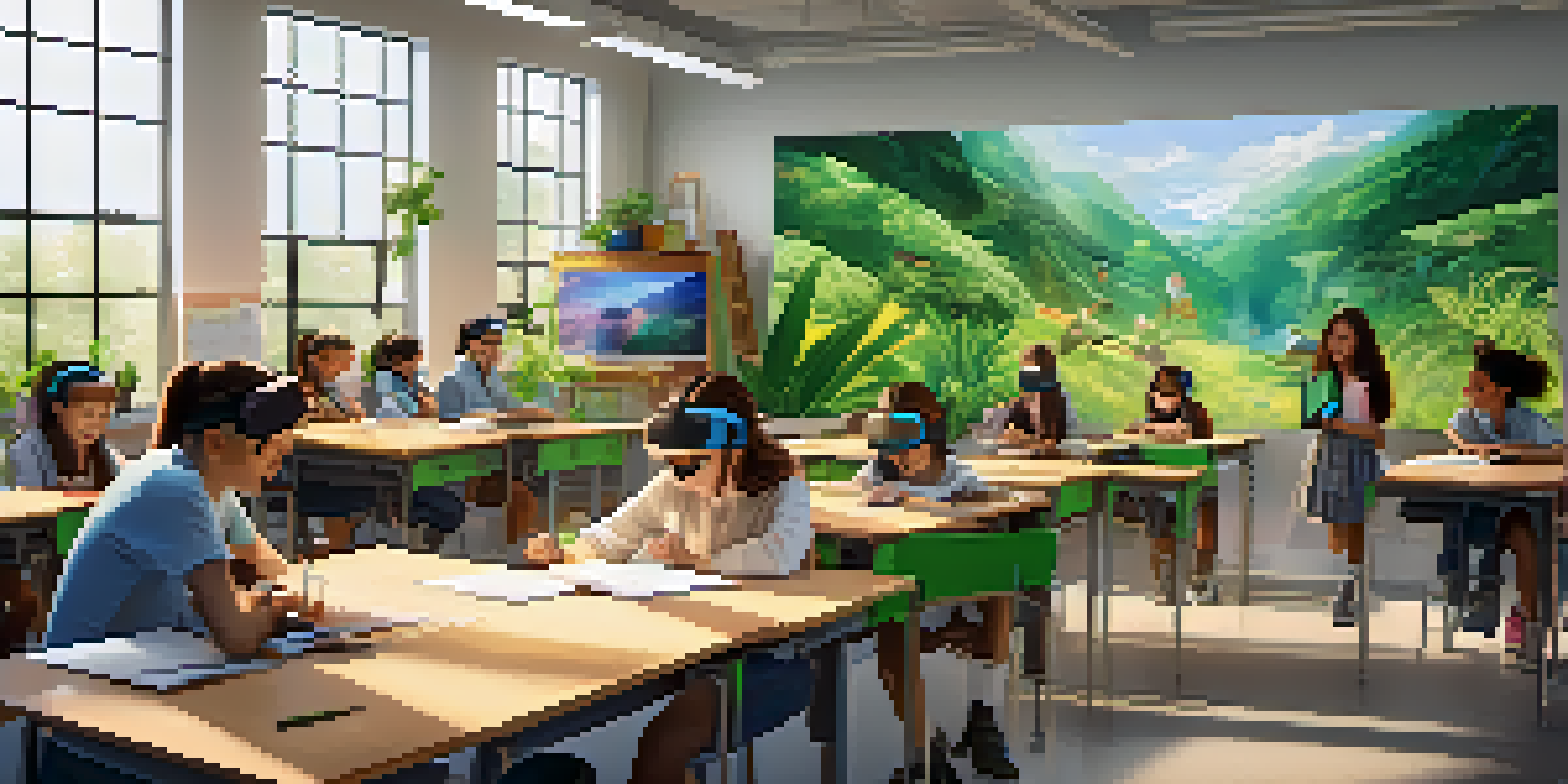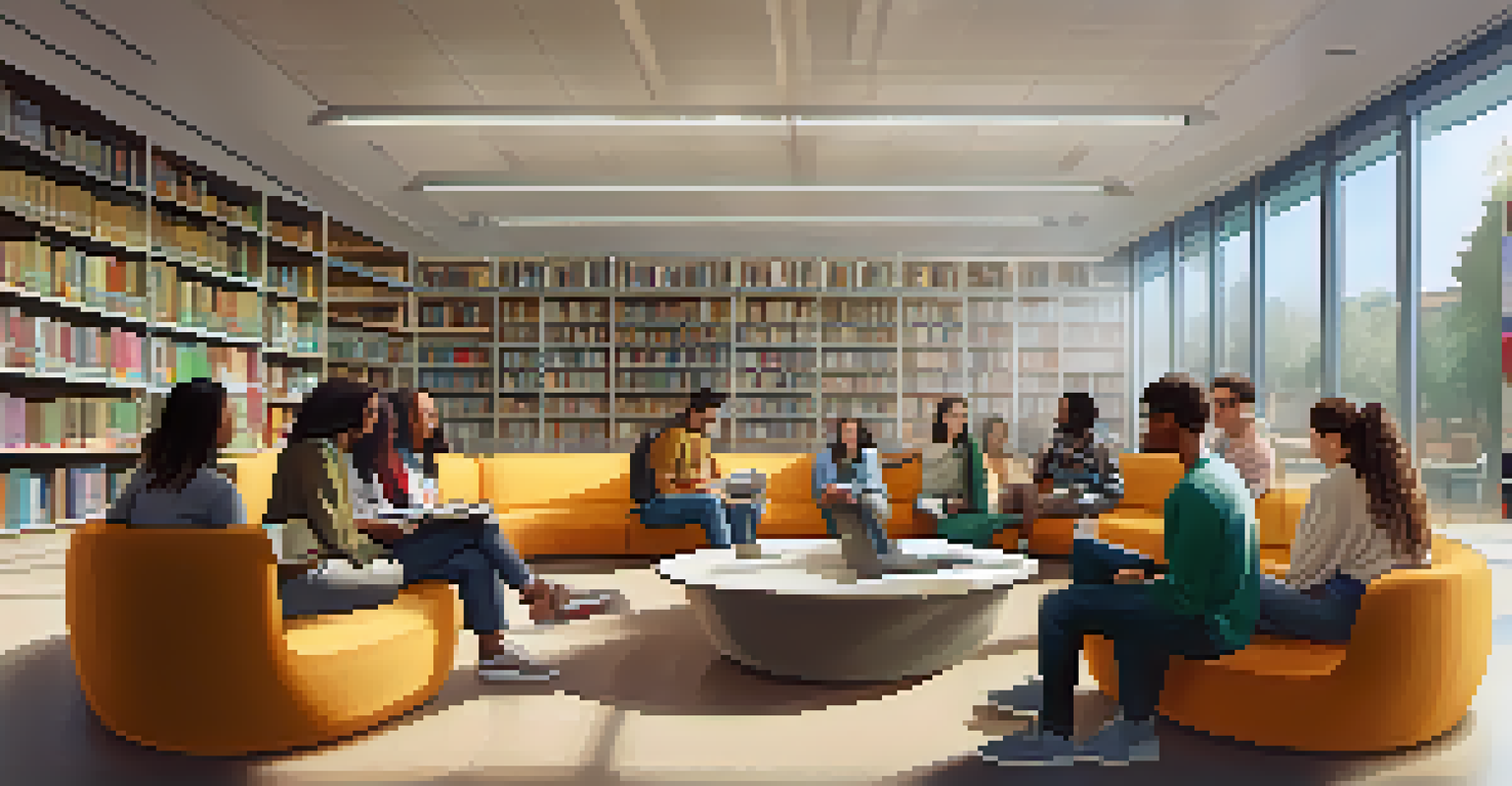Future Directions for Michigan State University Academic Programs

Innovative Approaches to Curriculum Development
As the landscape of education continues to evolve, Michigan State University is committed to adopting innovative approaches in its curriculum development. This means integrating technology and hands-on learning experiences that prepare students for real-world challenges. For instance, programs may increasingly incorporate virtual reality simulations to enhance learning in fields like healthcare and engineering.
Education is the most powerful weapon which you can use to change the world.
Furthermore, interdisciplinary studies are gaining traction, allowing students to blend knowledge from various fields. Imagine a student pursuing environmental science while also delving into policy studies; this holistic approach equips graduates with a broader understanding of complex issues. Such flexibility in curriculum design is crucial for fostering critical thinking and problem-solving skills.
Moreover, MSU is exploring partnerships with local industries to ensure that its programs remain relevant and responsive to job market demands. By collaborating with businesses, the university can create specialized courses that align with current trends and workforce needs, ultimately benefiting both students and employers.
Emphasis on Experiential Learning Opportunities
Experiential learning is a cornerstone of Michigan State University's strategy for future academic programs. This approach prioritizes hands-on experiences, such as internships, co-ops, and fieldwork, ensuring that students not only learn theory but also apply it in practical settings. For example, students in the agriculture program might engage in real-world farming projects, gaining invaluable skills and insights.

Additionally, MSU is enhancing its study abroad programs, allowing students to immerse themselves in different cultures while pursuing their academic goals. These experiences can significantly broaden a student's perspective, fostering adaptability and global awareness. It’s all about preparing graduates to thrive in an interconnected world.
Innovative Curriculum Development
Michigan State University is integrating technology and hands-on experiences to better prepare students for real-world challenges.
Finally, the university is also looking into community engagement as a vital component of experiential learning. By partnering with local organizations, students can tackle real community issues, from public health initiatives to sustainability projects. This not only enriches their education but also strengthens the ties between the university and its surrounding community.
Integration of Technology in Academic Programs
In today's digital age, technology plays a pivotal role in shaping academic programs at Michigan State University. The integration of advanced tools, such as artificial intelligence and data analytics, is transforming how students learn and interact with content. For instance, classes in data science are now incorporating machine learning projects, giving students hands-on experience with cutting-edge technology.
The future belongs to those who believe in the beauty of their dreams.
Moreover, online learning platforms are becoming increasingly popular, offering flexibility for students who may have work or family commitments. This shift allows MSU to reach a wider audience, providing access to quality education regardless of geographical limitations. It's a win-win situation where learning can happen anytime, anywhere.
Additionally, faculty are encouraged to incorporate digital literacy into their courses, ensuring that students are not only consumers of technology but also critical thinkers about its implications. By fostering a tech-savvy student body, Michigan State University prepares graduates for a workforce that demands digital competency and innovation.
Focus on Sustainability and Environmental Studies
As global concerns about climate change and sustainability grow, Michigan State University is placing a strong emphasis on environmental studies within its academic programs. This includes a commitment to developing courses that address pressing environmental issues and promote sustainable practices. Students can expect to engage in research that directly contributes to solutions for a healthier planet.
Moreover, interdisciplinary programs that combine environmental science with policy, economics, and social justice are becoming increasingly popular. This holistic approach ensures that graduates possess a well-rounded understanding of the complexities surrounding sustainability. For instance, students might explore the economic impacts of renewable energy initiatives while also considering social equity in environmental policies.
Focus on Experiential Learning
The university emphasizes internships and community engagement to enrich students' education and develop practical skills.
Additionally, MSU is actively pursuing partnerships with organizations focused on sustainability, further enhancing experiential learning opportunities. By collaborating on projects that aim to solve real-world environmental challenges, students gain practical experience while making a positive impact on the community.
Enhancing Diversity and Inclusion in Academic Programs
Promoting diversity and inclusion is a top priority for Michigan State University as it shapes its future academic programs. The university is committed to creating an inclusive environment where students from all backgrounds feel welcomed and valued. This commitment translates into curriculum designs that reflect diverse perspectives and histories, fostering a richer learning experience.
For example, MSU is expanding its offerings in ethnic studies and gender studies, allowing students to explore the complexities of identity and culture. Such courses not only broaden students' understanding of societal issues but also encourage empathy and critical dialogue among peers. This is essential in preparing graduates to navigate an increasingly diverse workforce.
Furthermore, the university actively seeks to recruit faculty from underrepresented groups, ensuring that students have role models who reflect their own experiences. By fostering a diverse academic community, Michigan State University enhances the educational experience for everyone, promoting a culture of respect and understanding.
Strengthening Industry Partnerships for Curriculum Relevance
To ensure that academic programs at Michigan State University remain relevant and responsive to industry needs, strengthening partnerships with local and national businesses is key. These collaborations allow for the development of specialized curriculum that aligns with current job market trends. For instance, a partnership with a tech company could lead to the creation of a new program in cybersecurity, addressing a growing demand for skilled professionals.
Moreover, these industry partnerships often provide students with invaluable networking opportunities, internships, and job placements. By connecting students with potential employers early in their academic journey, MSU enhances their career readiness and increases their chances of securing employment after graduation. It's all about bridging the gap between education and the workforce.
Commitment to Diversity and Inclusion
MSU is dedicated to fostering an inclusive environment by expanding diverse curriculum offerings and recruiting underrepresented faculty.
Additionally, feedback from industry leaders helps to continuously refine and improve academic programs. By actively engaging with employers, MSU can adapt its curriculum to meet the evolving needs of various sectors, ensuring that graduates are equipped with the skills and knowledge that employers are seeking.
Adapting to Global Trends in Higher Education
As higher education evolves, Michigan State University is keenly aware of the need to adapt to global trends impacting academia. One significant trend is the increasing demand for online and hybrid learning models, which offer flexibility and accessibility to students. By embracing these models, MSU can cater to a wider audience and provide education that fits today's busy lifestyles.
Additionally, there is a growing emphasis on lifelong learning, with many professionals seeking to upskill or pivot careers. In response, MSU is developing certificate programs and short courses that allow individuals to gain new skills without committing to a full degree. This adaptability not only serves current students but also attracts lifelong learners looking to further their education.

Finally, MSU is exploring global partnerships that facilitate student exchange programs and collaborative research opportunities. By connecting with institutions around the world, the university enriches its academic offerings and provides students with a truly global perspective. This approach prepares graduates to thrive in an interconnected world, where collaboration knows no borders.